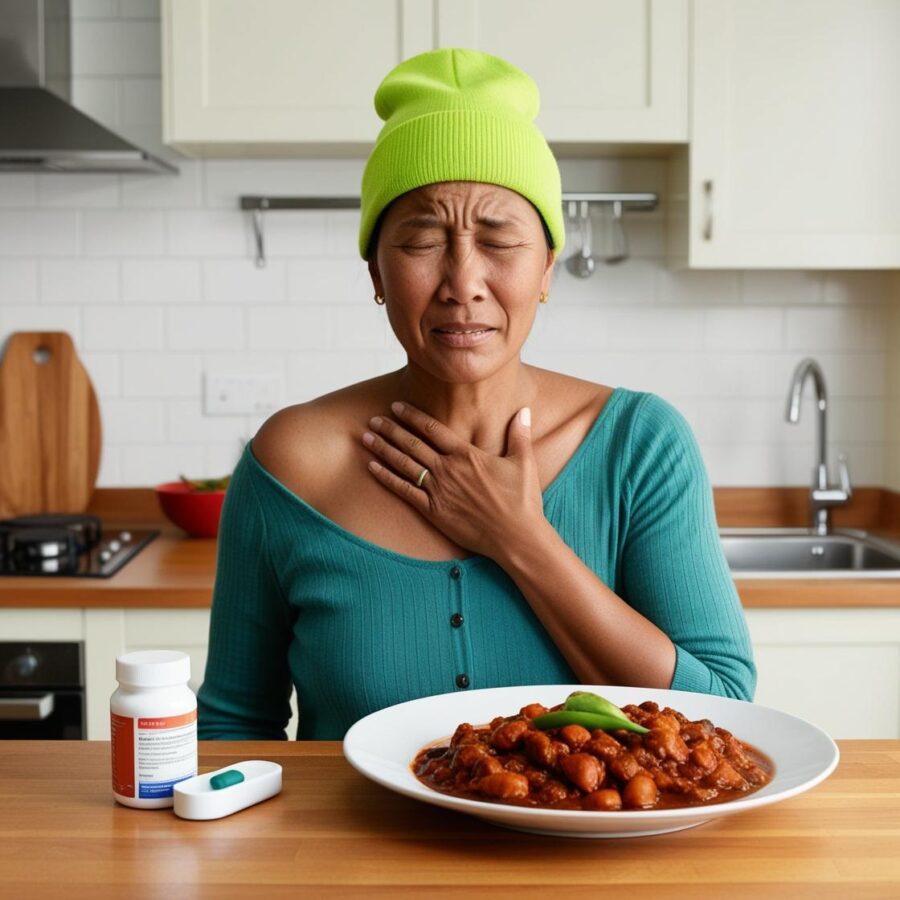Reflux, or heartburn, is a burning feeling in your chest or throat. It happens when acid from your stomach, needed for digesting food, comes up into your food pipe (oesophagus). Reflux is quite common if you’re having treatment for lymphoma, and for some people, the lymphoma itself can cause reflux.
If you get reflux often, it may be a sign of Gastro-Oesophageal Reflux Disease (GORD). This is a long-term condition that can cause complications if not managed properly. This webpage will give you useful information about reflux and GORD, how to manage it at home and when to see your doctor.
What is Reflux?
Reflux happens when stomach acid moves up into your oesophagus. The oesophagus is like a pipe that goes from the back of your mouth, down your throat and to the top of your stomach.
When you swallow, food moves from your mouth down the oesophagus to get to your stomach.
Reflux can cause a:
- burning feeling in your throat or chest (heartburn).
- sour or bitter taste in your mouth.
- feeling of pressure in your chest or throat.
- feeling of food coming back up from your stomach to your oesophagus (in your throat).
- cough or sore throat, especially at night.
- a feeling like you have a lump in your throat
- pain so bad in your chest that it may even feel you’re having a heart attack

What is Gastroesophageal Reflux Disease (GORD)?
If you have reflux more than twice a week or if it causes serious discomfort, you might have Gastro-Oesophageal Reflux Disease (GORD). This means your oesophagus is exposed to stomach acid too often, which can lead to:
- long-term irritation and inflammation (oesophagitis).
- scarring and narrowing of your oesophagus (making it harder to swallow).
- a higher risk of developing precancerous changes (Barrett’s oesophagus).
- Sores or ulcers in your oesophagus which can bleed.
Managing reflux early can help prevent GORD and its complications.
If you have reflux more than twice a week, or if it causes serious discomfort talk to your doctor.
If you have chest pain, it can be difficult to know if it is reflux or a heart attack. Always be safe and, when in Australia, call an ambulance on 000, or call your doctor immediately if you have chest pain.
What causes Reflux?
Reflux can be caused by:
- A weak valve (sphincter) between your stomach and oesophagus.
- Eating certain foods like spicy, fatty, or acidic foods.
- Lying down too soon after eating.
- Being overweight.
- Having pressure on your stomach such as tight clothing or belt, or a child or animal sleeping or jumping on you.
- Some medicine that relax the valve between you oesophagus and stomach, or irritate your stomach.
Does Lymphoma or its Treatments make Reflux Worse?
Yes, lymphoma and its treatments can make reflux worse. This can happen because:
- Steroids (like prednisone) and some chemotherapy drugs can weaken the stomach valve or increase how much stomach acid you body makes.
- Radiation to your chest or abdomen can irritate your oesophagus.
- Lymphoma in your stomach or chest can put pressure on your digestive system.
- Medicine for nausea or pain may slow digestion, meaning food stays in your tummy for longer.
If you already have GORD, lymphoma treatments might make your symptoms worse. Tell your doctor if your symptoms of GORD get worse while having treatment.
Is Reflux Serious?
Occasional reflux is common and usually not serious. Most people, even without lymphoma get reflux at some point in their life.
But if you have reflux often, it can:
- Damage your oesophagus over time (causing inflammation or ulcers).
- Make swallowing painful or difficult.
- Lead to a chronic cough or throat irritation.
- Increase your risk of Barrett’s oesophagus, which is a “pre-cancer” of the oesophagus.
If your reflux is severe or lasts a long time, talk to your so they can check for GORD or other conditions.
How can I manage Reflux at home?
There are things you can do to help reduce reflux:
- Eat small, frequent meals instead of large ones.
- Avoid trigger foods like spicy, fatty, or acidic foods (such as chilli, tomatoes and citrus).
- Don’t eat close to bedtime – Wait at least 2–3 hours after eating, before lying down.
- Raise the head of your bed by about 15–20 cm to stop acid from rising at night.
- Avoid tight clothing around your stomach.
- Limit caffeine, alcohol, and smoking, as they can make reflux worse.
If it’s okay, to try:
* Over-the-counter medicine called antacids (like Mylanta or Gaviscon) to neutralise acid.
* Acid-reducing medicine (like omeprazole, pantoprazole or ranitidine) if needed.
When should I contact my Doctor?
Contact your doctor if you have:
- Reflux that won’t go away or is getting worse.
- Trouble swallowing or pain when eating.
- Unexplained weight loss.
- Vomiting or coughing up blood
- Black poo or poo that looks like tar or is it sticky when you wipe (which can be a sign of bleeding).
These could be signs of GORD or oesophageal damage that needs medical attention.
Summary
Reflux is a common problem that causes heartburn, a sour taste, or throat irritation. If reflux happens often, it could be Gastro-Oesophageal Reflux Disease (GORD), which can lead to long-term problems if not managed.
Lymphoma and its treatments can make reflux worse, but you can reduce symptoms by:
- changing your diet
- avoiding trigger foods
- adjusting how you eat
- wearing loose clothing.
If your reflux is severe, painful, or doesn’t improve with simple changes, talk to your doctor.